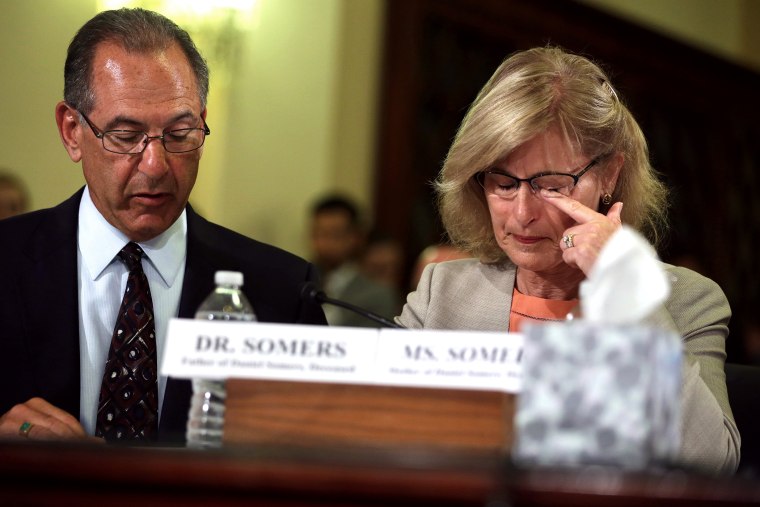Nearly two dozen veterans commit suicide every day, and their parents won't let Congress forget it.
At a House Veterans Affairs Committee hearing Thursday, legislators promised, once again, to improve the system for the men and women who must rely on VA mental health care.
In emotional testimony, the parents of three young men who committed suicide described their sons' struggles to see mental health care specialists, fill prescriptions, and navigate crowded, labyrinthine VA medical campuses.
“Not one more veteran should have to go through what Clay went through,” Susan Selke said of her son Clay Hunt, who committed suicide in March 2011, two weeks after seeing a VA psychiatrist. Despite Hunt’s active involvement with veterans groups like IAVA -- including Storming the Hill, its annual suicide prevention awareness raising drive -- Hunt was left feeling dejected and undertreated for his post-traumatic stress.
The U.S. Department of Veterans Affairs has been embroiled in controversy since April when allegations first surfaced claiming that there were so-called “secret waiting lists” for veterans at the Phoenix VA, and that at least 40 veterans died while waiting for primary care appointments. Then-VA Secretary Eric Shinseki resigned at the end of May, since which time Congress has failed to pass any legislation addressing the problems at hand.
At Thursday's hearing, the parents who testified asked committee members to increase resources, look into changing the way veterans are medicated, including expanding the types of medicines covered by VA insurance, and creating a more comprehensive mental health care system that centralizes care.
“[The VA] must dramatically improve its mental health care delivery. Access is an issue, but we have to ask ourselves, ‘Access to what?’” Josh Renschler, a retired Army Sergeant said. Both in his own experience getting care and as a peer counselor for other veterans, Renschler said he saw an acute need to do more than ask battle-scarred men and women directly if they are contemplating suicide.
Howard and Jean Somers spoke at the hearing about their son Daniel and his experience with the Phoenix VA medical system, which has been at the heart of the still-unfolding scandal over long wait times, substandard care, cover-ups, and retaliation against whistleblowers. Daniel, the Somers said on the verge of tears, once tried to get himself admitted to the hospital during a mental breakdown, only to be turned away for lack of beds in both the mental health and emergency departments.
According to Howard Somers, when Daniel broke down crying in a corner of the ER, he was told he could stay until he felt well enough to drive himself home, but despite proximity to two other health care facilities within less than two miles, he received no additional help. Daniel Somers committed suicide on June 10, 2013.
"If we don’t get it right this time, shame on us."'
On Tuesday, the House Veterans Affairs Committee heard testimony from a VA whistleblower who at one time oversaw the Phoenix VA emergency department. Dr. Katherine Mitchell testified that she saw serious errors occur because of understaffing in the department, but that errors went unaddressed and the ER remained strapped for resources. ”It is a bitter irony to me that I as a physician could not guarantee [patients’] safety in the middle of cosmopolitan Phoenix,” she said at the hearing.
Thursday afternoon, House Veterans Affairs Committee Chair Jeff Miller, R-Fla., Rep. Tammy Duckworth, an Illinois Democrat and Iraq war veteran, and Richard and Susan Selke appeared together to announce the Clay Hunt Suicide Prevention for American Veterans Act (Clay Hunt SAV Act).
"This bill will provide awareness for veterans suicide and help provide loans to those seeking a career in mental health at VA," Duckworth said.
Miller also said Thurday that he expected the Congressional Budget Office to have a new cost estimate for a VA reform bill aimed at increasing the number of VA facilities and health care providers within the next two days. Disagreements over how to pay for the bill have slowed work on creating a compromise between House and Senate legislation
The House’s SAV Act is not the first measure aimed at suicide prevention to be proposed during America’s 13 years of war. Sen. John Walsh, a Montana Democrat, introduced a Senate suicide prevention bill in March. And in 2007, Congress passed the Joshua Omvig Suicide Prevention Act, which established a crisis phone line and increased training in suicide prevention for VA staff, but members of the House committee criticized the VA for what Walz said was the department’s failure to implement the bill well enough.
Of the new bill, Walsh said, “If we don’t get it right this time, shame on us.”
Peggy Portwine, whose son Brian suffered from post-traumatic stress and traumatic brain injuries after surviving multiple IED attacks while deployed in Iraq, said, “I promised my son at his funeral that I would stop this injustice. These are quality young men who potentially had so much to offer society.”
